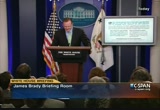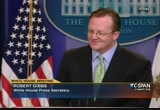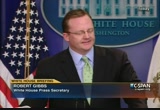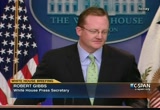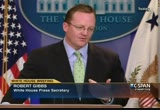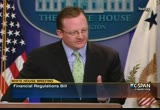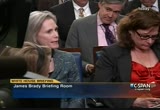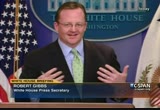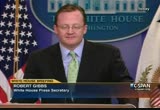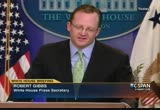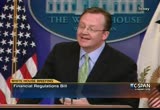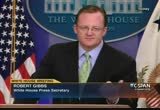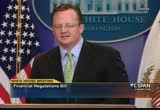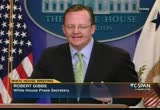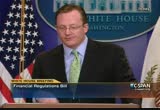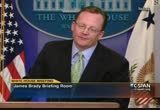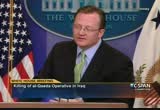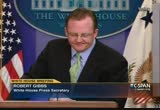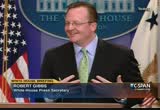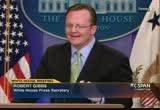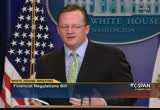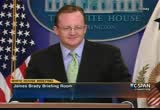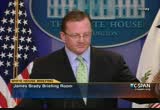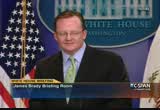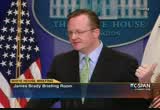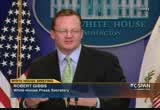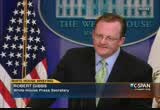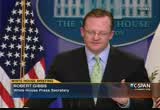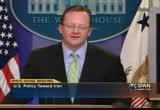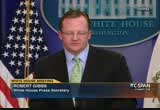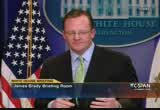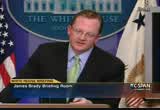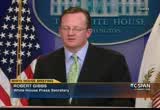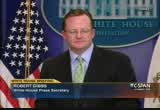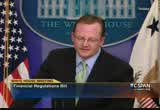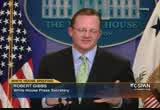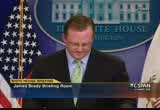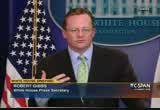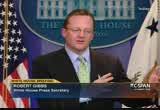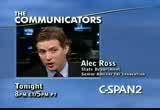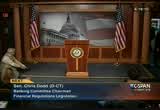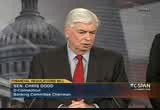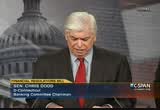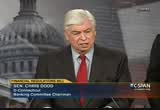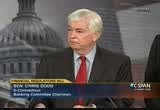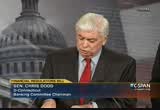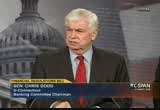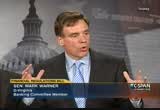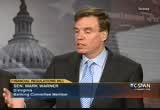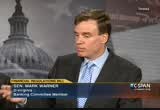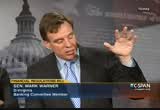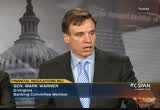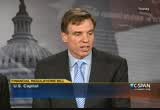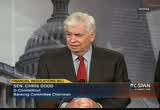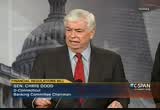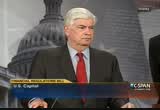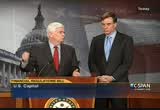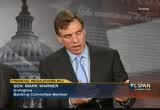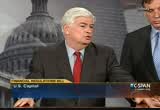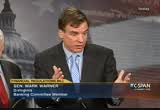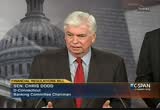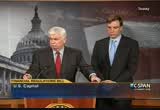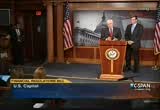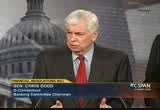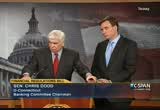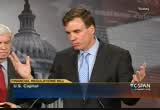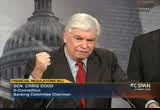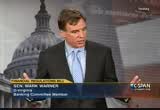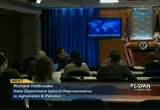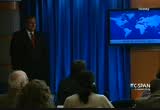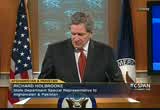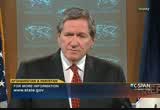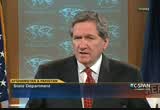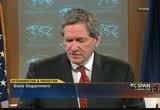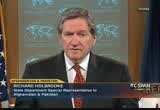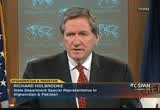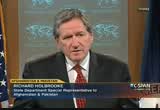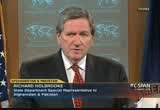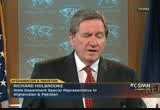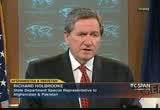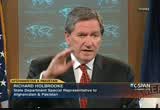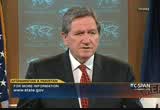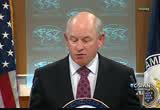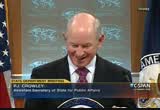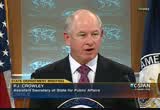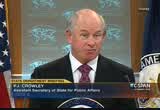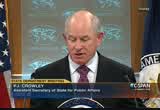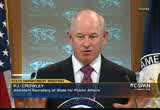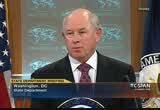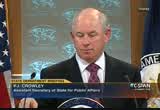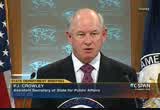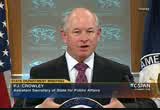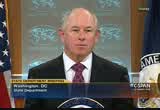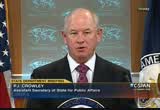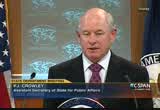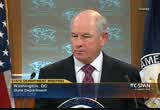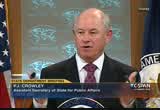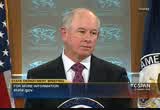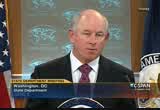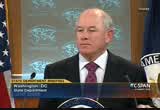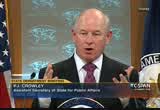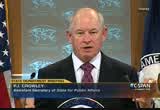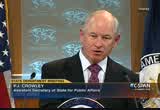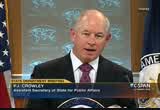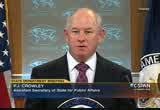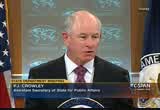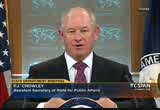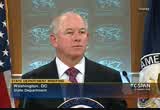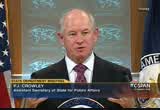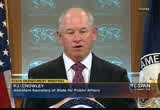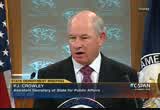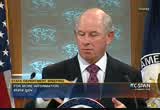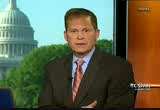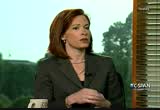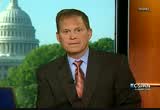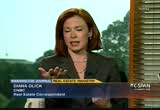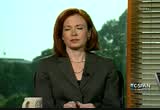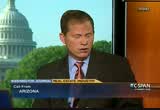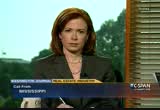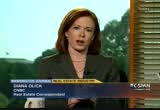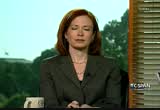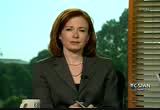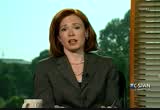tv U.S. House of Representatives CSPAN April 19, 2010 5:00pm-8:00pm EDT
5:00 pm
combat mission in iraq this summer by the end of august 2010, and according to the u.s.-iraqi security agreement signed a couple of years ago, to remove all u.s. forces from iraq by the end of 2011. as we complete the security transition, we will continue to work to build a lasting partnership with the iraqi people and their government based on the many shared goals we have be on the military cooperation, including the economy, education, cultural institutions, and the development of a strong economy for rack. . -- economy for iraq. .
5:01 pm
>> good afternoon. the internal revenue service today began mailing postcards to more than 4 million small businesses and tax-exempt organizations, to make them aware of the benefits of the recently enacted small-business health care tax credit. the credit, which takes effect this year, is designed to encourage small businesses to offer coverage for the first time, or to maintain coverage they already provide. we want to make sure that employers realize that effective this tax year, they may be eligible for a valuable new tax credit.
5:02 pm
we encourage every small employer to take effect of this credit. in general, it is available to employers who pay at least half the cost of single coverage of an employee in 2010. the credit is specifically targeted to small businesses and tax-exempt organizations that primarily employed low and moderate income workers. those post cards are being mailed today. with those two announcements, i will take questions. >> a vice president said that this operation was carried out by iraqis based on intelligence and they gathered themselves. what was the american role in this operation? >> the american role was to continue to provide necessary help and support, as the iraqis undertook the security operation itself. >> can you give us some idea --?
5:03 pm
correct there is a statement out by general odierno and others -- >> there is a statement out by general odierno and others. i would point you to that. correct moving on to financial regulations -- >> meeting on beyond financial regulations. do think there will be support for sanctions on the run? >> i would point year -- would point you, first and foremost, iran continues to fail to live up to the important obligations that they signed onto years ago. i would point out dope -- i would point out of the zero, that -- i would point out of the -- i would point out that te
5:04 pm
report shows that they have trouble matching what they say and what they do. they continuously make pronouncements about a whole host of their programs which may or may not actually meet the facts of what they are capable of doing. that is not to say that we do not take the fact that they are not living up to their obligation seriously. that is why the president has taken the steps he has taken in putting together an international coalition to address this. >> in regards to regulatory reform, can you go into what is
5:05 pm
happening to the president's visit to new york on a thursday? will he be discussing specific policy ideas? can you talk about goldman sachs? do you think the charges will galvanize legislatures? >> views are not going to get into discussing regulatory action -- users are, and action taken by an independent regulatory -- i am sorry, an action taken by an independent regulatory agency. i am not entirely sure that given that the economic downturn was caused in many ways by financial irresponsibility, i am not sure that we needed a prescience reminder of what is at stake. there was plenty of evidence
5:06 pm
friday morning, before the sec got involved, of the need to create new rules of the road, and a desire by the american people to see those put into law. the president will travel to new york on thursday to once again make the case to the american people about what financial reform is so important to get done and to get done quickly. we are approaching, as i said, the second anniversary of this collapse. i think the american people want us to not play politics with this important issue, but instead, to get something done. that is the case that the president will push this week. >> to follow up on iran, the deadline was april. the deadline seems to be stretching out quite a lot. >> as the president discussed with president is a cozy at the white house just a couple of weeks ago -- with president
5:07 pm
sarkozy at the white house just a couple of weeks ago, we expect to get sanctions passed and in place by this spring. >> meaning next month? >> i am not a good person to tell you when the spring begins or ends, but i would say in the next couple of weeks. >> the british elections are coming up in may. can you give us an update of where the special relationship is? >> we continue to have that relationship with great britain, regardless of the outcome of that election. they will be one of our closest allies in the world. we have had that type of relationship for quite some time, we have a very strong relationship with them now, and that will continue regardless of the outcome of the election on
5:08 pm
may 6th. >> there is a report coming out from the house of commons saying that that phrase should not even be used anymore, that it is ridiculous to even use it. are you convinced that the u.s. should continue referring to it as a special relationship. >> i do not have a special relationship with the phrase "special relationship." we do have a special relationship with britain. you can banter back and forth on the banter that we use. the testament to the special relationship is the action that the two countries undertake together, whether it is working hand-in-hand to ensure that our economy -- that the global response to the economy is met.
5:09 pm
it regards our efforts in afghanistan and a very important place in the world for our security and theirs. it deals with issues like energy and climate change. there is no risk stronger relationship in the world. >> financial reform? >> secretary to geithner and others have said that over the next few weeks the senate will take this up. hopefully it will begin later this week. i think we will have a strong, bipartisan vote on financial reform in the next couple of weeks. >> [inaudible] >> i absolutely believe so. i think the president, the secretary of the treasury and others have met throughout this process with republicans who are interested in ensuring that we
5:10 pm
have strong rules, covering our financial system, and i think in the end, i think there will be a bipartisan vote. >> can you speak for the republican leader? >> it would be awkward for me to trade in my current vote and speak for the republican. i do not know whether senator mcconnell is interested in putting wall street in charge or putting the american people back in charge, but helen, he will have a chance to register whose side he is on later on this month. >> he produced a letter with 41 senators names on it. >> again, at secretary pioneer met with senator shelby on friday. he is meeting -- secretary brightener -- secretary geitner met with secretary shelby on a
5:11 pm
friday. he will meet with secretary collins today. we do not mark the anniversary of our financial collapse with the same rules we had then. >> are the charges against goldman related to the republican leader appearing to have enough votes to filibuster? >> i want to stress again that the sec is an independent agency. i think there was plenty of evidence of the necessity for financial reform long before the announcement on friday. the actions that wall street under took over the course of many years to get us to the point where we saw the collapse that we did, is proof enough that something has to change, and something has to change this year. >> you said that the sec does not tell the white house this
5:12 pm
information. it find other routes. or people in at the white house aware that this suit was coming? >> no, absolutely not. >> timothy geithner is meeting with secretary collins today. are there other people he is planning to meet with? >> i can try to get with -- i can try to get the list of people he has met with. >> specifically republicans. >> mitch mcconnell and john boehner. >> i mean people who are likely to vote with you people. >> i think that timothy conner
5:13 pm
has been meeting with german dodd -- has been meeting with -- german dog -- chaiman dodd has been meeting with people. hopefully, this week we will be able to proceed with legislation to send a strong message to the american people that we are going to put some common-sense regulations back in place to prevent the kind of shenanigans that happened from happening again. >> are you willing to compromise on any specific measures in order to get republican votes? >> not if compromise means we are doing something on behalf of watering down of legislation on behalf of the banks.
5:14 pm
we outlined a proposal last june. again, senator dodd and secretary by to learn -- secretary geitner have been meeting with republicans. we are not watering down financial reform on behalf of big banks. we are just not going to do that. if that is the price of what republicans want for them to call reform, that is not apprise the president is willing to do. i do not think it is a price of the american people are willing to do. >> it sounds like you're not categorically willing to make any changes. >> for years, big banks had regulation on their side, and it led to what i think most people would say was the worst economic
5:15 pm
downturn in their lifetime. i do not know why we would need that economic downturn -- why it would be met with pending regulatory power to the big banks and watering this down. >> where does the president stand on this? >> an idea that was not in our original proposal last june, an idea that was i believe, first proposed by someone at the fdic, is something we will continue to work with senator dodd on. many of the characterization's you have heard are curious.
5:16 pm
this is a fund that is paid by banks in order to provide the government with the type of resolution authority it needs to ensure that taxpayers are not on the. hook. there are some on the other side who would lead you to believe that they are taking up this fight in favor of stronger regulation. >> is it something the president would be willing to compromise on? >> again, it was not in our original proposal. >> the treasury secretary has testified that it is a bad idea. >> we have looked at the white paper that was introduced when we laid out our plan. it was pretty long, and that was not in it. >> back to iraq, could this have
5:17 pm
happened without the support of u.s. troops? >> obviously, the iraqis were in the the lead. general odierno has pulled back forces from different areas. i think the mission demonstrate their continued growing capability to deal with a very tricky security situation. i think that will only increase as we get closer to both, as the vice-president mentioned, the next two deadline's coming up in terms of pulling back our forces in iraq. >> what is the spring deadline about? is it about sanctions, or is this a comparison to the strategic group in afghanistan and pakistan?
5:18 pm
a memo was leaked by secretary gates this weekend. >> i would be happy to comment on the memo. >> beyond -- >> let me just say this. i hope everyone actually read what secretary gates said yesterday. i should choose my words carefully here. to write an entire story based on the description from somebody leaking a memo to a reporter without actually having seen the memo, it is fairly extraordinary. i would certainly hope that you would all look at what secretary gates, the author of the memo,
5:19 pm
said. had you read the story, you would have thought that the reaction was hair on fire and scurrying around. those that read the memo here, and secretary gates, neither of them believe that is the case. i will go to extraordinary lengths to say that i thought the story was extraordinary in its ability to convey what was not part of what was conveyed. >> are we in the middle of a strategy review in how to deal with iran? >> know, we have a dual track approach. the international community has, on many occasions, made overtures to the iranian government to live up to its responsibilities. we have said the failure to live
5:20 pm
up to those responsibilities will result in action but the un security council on showing -- on sanctions. we have seen statements and reaction from the russians and the chinese in support of the process. that is where that process is. this multi-lateral. we have also seen over the course of the past several months, the u.s. government has tightened its sanctions on aspects of the iranian government. obviously, there are still also the possibilities of looking at additional sanctions that could be implemented outside of something in the un security council. there have been announcements in the last couple of weeks by companies that have unilaterally decided to no longer do business within iran. i think all of those are positive developments leading to
5:21 pm
what the u.n. security council will do. >> you have avoided talking about what the goldman sec issued means. the dnc decided to buy google advertising. do you think that was appropriate? >> it is not as if the president began talking about financial reform sometime on friday afternoon. the conditions that led to what happened in this economy to years ago -- two years ago -- the president is going to speak at the same place he spoke in 2008 while calling for financial reform. he gave a speech right after labor day in 2007 also calling for refinanced a reform -- for financial reform.
5:22 pm
in the stand that this is taking up a big chunk of real estate in the news world. i do not, in all honesty, believe it -- you have president -- you have plenty of evidence out there about the need for financial reform. you are speaking to someone who is fundamentally ill-equipped to talk about bad buys and keywords. >> are you guys at all concerned on a perception issue that anyone with ties to goldman will have to recuse themselves, such as timothy geithner? >> i do not know the degree to which what the sec alleges -- i think the sec was pretty clear in the naming in that suit who
5:23 pm
was involved. >> but we'll have to go back and let anybody who was -- but will you have to go back and look at anybody who was with goldman at that time? >> i am not sure. >> are you planning to change the way you deal with the press? are you unhappy with it? >> am i unhappy? no. i will say this. i think as long as there is a press, and a press office, there will always be some level of adversity. in the words of the very astute helen thomas.
5:24 pm
we had a very cordial meeting with the white house correspondents association. we talked to them about -- they changed -- they talked to me about changes they would like to see. i discussed a few things that were of concern to me, not the least of which was the sheer level of support that our office seemed to provide on overseas trips. i think there were some good -- on each side of it there were hopefully some good suggestions that we can all incorporate. >> do you think access is going to change? do you think you are as transparent as you can be? >> this is the most transparent administration in the history of this country.
5:25 pm
i would say this. it is an example i tend to use because it happens every so often. the previous administration, in order to prevent many of you all from knowing who were in meetings -- in our administration, that comes out once a month. that is the sort of thing i am very proud of. i think the american people can be very proud of it too. >> you have said that no one at the white house had word from the sec. but were there any cues from the white house or from the administration that you would like to see enforcement actions taken on wall street? >> again, i want to reiterate so that everyone is clear, the sec
5:26 pm
is, by law, an independent agency. it does not coordinate with the white house. we received no advance notice of any enforcement action. >> did you give a signal to other justice or the sec that you would like to see some -- >> again, by law, the sec is an independent agency. this white house did not give, and as the administration did not give any signal about enforcement mechanisms. again, i think it has been clear for far more than two years, about where the president, the role the president believes financial reform needs to play in cleaning up the system. the president will speak at cooper union, where he spoke in march of to the innate about this same issue.
5:27 pm
-- march of 2008 about the same issue. >> about the $50 billion fund. is there a way to clarify whether this money would be for shareholders, creditors, or would it be for unwinding? >> this was a proposal inserted about -- inserted by senator dodd. i would point to him and his committee. >> the british government is talking about using naval ships to bring back people who are stranded but this volcano situation. what is the u.s. government going to do for americans who are impacted by that? >> we received a call this morning from our ambassador to give an update year. i think there are approximately about 40 cows and americans --
5:28 pm
40,000 americans in england who are trying, because of the destruction in air travel, to get back to this country. we are working closely with the state department to examine all of the opportunities that we have to speed this process along. some people may being -- they have gone on vacation, they are running out of medicine, they do not have a place to stay. we are looking very closely to see what can be done to facilitate that. obviously, as you all know, the president goes to travel to europe was canceled because of the -- the president's travel to europe was canceled because of the concern by the air force about the error situation.
5:29 pm
-- being air -- the air situation. the concern came from the ambassador today in just underscoring the level of destruction that a seemingly simple thing has caused. as i understand, there are some airports that are beginning to open, some aerospace that is opening, that will likely speed some of -- what we want to do is examine what opportunities we have, even as other parts of europe open, not having to have 40,000 from england go all the
5:30 pm
way around the continent just to come back. we are looking into a whole host of options. >> would you consider using military assets? >> we have some big ships, but that would be a pretty big ship. i do not want to get ahead of the discussions that we have had. up to this point, i have not heard anything like that. >> what is the level of concern about the impact on the airline industry, which is already on shaky financial ground? >> we have all seen the pictures of the boards in airport with hundreds of flights canceled. this has caused destruction not just to the traveling public, but economic disruption.
5:31 pm
we are seeking every opportunity to help facilitate a solution to this, and watching it closely. >> in financial reform, it is pretty clear that the president is negotiating but unwilling to water anything down. how many votes do think you will get? is one of bipartisan? >> i am not going to guess. >> what is your definition of a bipartisan? >> i think he will have republican support. i will be honest with you. i do not think anybody wants to go home and explain why they were spending their time focused on keeping the big banks in charge. >> on derivatives, the president has been very clear that he will be to as something that does not have strong derivative of language. will he endorsed blanche
5:32 pm
lincoln's language on derivatives? >> i think timothy geithner and senator lincoln have been working together. there is a tremendous amount of overlap in what we would like to see and what she had in her bill. i do not know what the resolution will be. >> but -- >> i think they have had some good meetings together. i think there was a concern that, that obviously senator lincoln did not share, there was a concern that what could eventually come out of this process was something that was watered down derivatives, and i think senator lincoln has clearly taken a strong stand to ensure that these types of instruments are dealt with in the financial reform.
5:33 pm
i think there was concern that there was going to be -- that the legislation as it dealt with derivatives at large was not strong enough. i think senator linkedin has proved in her bill that that is certainly not the case. >> did the president requested a memo from the defense secretary? >> this was a memo that he wrote as part of the regular planning process that had gone on since the beginning of the administration, preparing for any type of contingency, either on iraq, or in any other topic. there are hundreds of memos being written right now throughout this government and
5:34 pm
throughout the pentagon as part of the normal policy planning process. thought that is why those of us who opened up the newspaper and saw what this memo was categorized to be, the author founded not to be in the ballpark of what the memo was. [laughter] you're a smart guy. you should go on to the far -- go on the department of defense website. i do not think there was a moment where you would read that and then think what you read in "the new york time" was in the ballpark. i find it fairly astounding that somebody could leak something, call up a reporter, say, "here
5:35 pm
is what the memo says," and the reporter does not ask to see the memo. it is a pretty amazing thing that the newspaper did coverage based on something that the author of the memo -- i mean, this is top secret. you guys have not seen the memo. >> was january of time, internally, when the word commencing a different set of policy issues -- 9 >> i would put that question to the defense department. >> let me ask you about value added tax. is there anything the
5:36 pm
administration is doing to deal with the economic ica aalue add. >> this is n that the president has proposed. >> there are hundreds of memos being written at any given time. >> of the president has not proposed this idea, nor is it under consideration. >> there maybe a subpoena of documents related to fort hood. >> we would point you and others to the defense department as to how they are conducting that investigation. >> as far as transparency -- >> the department of defense is handling that investigation. i would urge you to call them.
5:37 pm
>> could you talk about the president's meeting on sudan? >> i think the president was running about 15-20 meeting -- a 15-20 minutes behind schedule. we will have a reaction to that as soon as i get back. >> has the president had any conversations with governor christie about possibly changing parties -- with governor christ about possibly changing parties? the race is very tight in pennsylvania board the replacement of the sea by congressman murtha. is the president planning to endorse a candidate? >> i can see if there is
5:38 pm
anything plan on that. i do not have an answer to that. >> the president spoke in florida about health care reform. how does he feel about that candidate in pennsylvania saying he is opposed to? >> i do not doubt that there will be people in this season who will campaign on a whole host of policy positions. i think given where we spend our time and energy, where we are, we're fine. >> is the president looking to
5:39 pm
primarily sway democrats or republicans with this financial policy? >> senator reed has said that his hope was to proceed to legislation later this week. i do not think that the message is intended for democrats. i think it is intended for those in washington and throughout the country, primarily in washington, that we need to act, that our failure to act simply perpetuate the system and the set of rules that got us into this mess. again, to reiterate our strong desire that this happen quickly, we are coming up on the second anniversary of the collapse. the president believes it is enormously important to get this done this year.
5:40 pm
the senate should take this up so that we can get a final product to the president goes to a desk in the next few months -- president's desk in the next few months and change the rules going forward. >> can you talk about how tomorrow will work with the supreme court? >> you should point any questions on that to william. in terms of wednesday, a bipartisan senate leaders and judiciary committee leaders will be over here to speak to the president. as the president did in the lead up to naming a supreme court nominee as he did last year, he will have meetings on process, procedure, and names that they
5:41 pm
are interested in. he will also discuss with them the notion of getting, like financial reform, getting this done well before the senate leaves in august. given the time frame in which justice stevens announced his retirement, basically where we were last year, that seems doable. i do not know whether it will be open. we will probably do some pictures. >> [inaudible] >> i would not dissuade you from
5:42 pm
the scope and the numbers that have been talked about for the last several weeks. we are in a process in which the president and his team are adding names to be considered, not in a process of a winnowing those games down. -- of winnowing those names down. the president wants to look at as many options over the next couple of weeks as possible. i will be honest with you. i do not want to put an upper limit on the number of people that the president, heidi qualified individuals that the president could consider it -- highly qualified individuals that the president could consider over the course of this. >> when ever top members of all
5:43 pm
qaeda are killed, people think about osama bin laden. what is the status of osama bin laden? >> without getting into specific target, i will say this. i think if you examine the tempo with which this administration has prosecuted the war on terror, in rooting out and helping to, as we did in iraq, helping to root out high-value targets, we have done so in a way, i think, that by all accounts has greatly damaged the capabilities of al-qaeda. but we know that as long as the art -- as long as there are those members that seek to do this country harm, the president
5:44 pm
will remain vigilant in pursuing those targets. >> after 9/11, everyone was talking about catching a osama bin laden. >> obviously, bringing him to justice, capturing or killing him, obviously remains a priority. i think if you were to only focus on one, and not on, quite frankly, a broader a way of important players in al-qaeda, we would not be discussing today an important and debilitating step that helped further cripple al-qaeda in iraq. >> back to financial reform. just a few minutes ago you
5:45 pm
called on senators mcconnell and core went to talk about what they -- and caroryn to discuss what they talked about in that meeting. >> it was a very curious series of events. it might be helped through explanation. i watched senator mcconnell struggle to define and explain that on television this weekend. i think i would probably just leave it there. >> i was at the rally last thursday. it socialist rhetoric was predominant. someone was talking about communists and the white house.
5:46 pm
is there any plan to bridge that pretty large disconnect? >> with the president referred to was the notion that in a time of great economic calamity, the president has taken a series of, albeit sometimes all popular -- and sometimes unpopular, but necessary steps to make sure that our economy did not collapse. in the meantime, he also cut taxes for 95% of working americans. i think that the president will continue to take the steps he thinks are necessary to get our economy moving again, to get people back to work, and to get our fiscal house in order, a lot of which will help those who are protesting. >> within the socialist rhetoric
5:47 pm
our comments -- are comment's like the one that the president should be sent back to kenya. >> i could probably spend the better part of the afternoon responding to the general lunacy of comments like that. given that i have no desire to do that, i am not going to start. >> there is a concern in new york city that going board with financial reform could hurt the tax revenue base in new york. what do you say to criticism that financial reform could actually hurt the local economy in new york city? >> i would say that the president believes that we can put important and stronger rules
5:48 pm
in place that do not impede on people being able to make money, to represent their clients, and to invest. the president wants to protect all of those things. but what we have to do is ensure that there are not rules that are in place that ignore the circumstances that surround those types of activities, or provide incentives to ignore those rules in order to pursue risky investments, obtain profits that ultimately leave the taxpayer on the hook for a bailout. that happened in 2008. the crisis has been managed to the point where the amount of money that has not been paid back to taxpayers is very small, given what was loaned to them.
5:49 pm
we does have to make sure the rules are in place so that taxpayers in new york city do not get handed a bill when a group of individuals decide to take some risky actions that caused a significant portion of the economy to collapse with it. i would bet if you look at an asked some of those in new york whether what led up to and caused what happened two years ago has been good for the local economy or not, my sense is that many of them would say that the resulting calamity has not been helpful to the local economy. the president wants -- is a strong an ardent believer in our capitalist system. we just have to have rules in place that ensured that it
5:50 pm
cannot be that somebody gets all of the benefits and shoulders none of the risks forum -- for the type of behavior that we saw that led to this calamity. thank you, guys. >> part of why internet fame is so complicated is that it is a security issue, it is an economic issue, and it is a human rights issue. it is all of those things around into one. >> the state department hopes to use technology to advance at diplomacy. this senior adviser to president clinton will be on "the communicators" tonight. >> let's meet another winner in our studentcam competition. we asked middle and high school
5:51 pm
student about our country pose the greatest strength or greatest challenge. -- our country pose the greatest strength our greatest challenge -- our country's greatest strength our greatest challenge. why do you think education is one of the greatest challenges we are facing? >> over the past few years, we have continued to slip in our international banking? -- our international ranking. i think education is one of the most powerful tools you can use it to change the world. >> what is the oecd? it is the >> is the organization for economic cooperation and development. it helps sustain economic growth, and boost employment,
5:52 pm
improve living standards, and help world trade. >> what is pisa? >> that stands for program for international student assessment. it was formed in the mid-1990s, and was designed to provide countries with accurate data about the education system. >> how do americans consistently rank of pisa testing? >> american students have consistently ranked average on all subject areas on the p i s eight test -- and pisa -- on the pisa test. >> what do these rankings mean? >> we need to work harder on our scores or we will continue to fall behind. >> speaking about your own education experience and community, what are some areas that are working? >> at my school, the teachers
5:53 pm
focus on cooperative learning and creating a positive learning environment. >> what are some areas that you think need to be improved? >> i think teachers salary is an area not working well. currently teachers are paid based on longevity instead of performance. >> with what have you learned from the people that you interviewed? >> i learned a lot. the headmaster at my school taught me a lot about different cooperative learning strategies, such as getting students to focus more by bringing different activities into the classroom. >> in your documentary you mentioned what a county in florida is doing to increase student performance. what are they doing? >> we are one of four counties to receive a grant from the bill and melinda gates foundation. this money will go to teachers in the classroom.
5:54 pm
they want to identify good teachers and use them as mentors for other teachers. >> why do you believe increased government spending does not help student achievement? what i don't believe it hurt student achievement. i just believe we need to focus more on how it is spent. i also believe we need to change our culture and place more emphasis and value on education. i think students need to realize that school works for them, and apply themselves more. >> thank you for spending this time talking to us today. congratulations on your win. here is a portion of this documentary. >> many people consider the united states to be the leader of the free world. as the leader, should we not have the best education system? we should continue to make the world a better place opposite. do we currently have the best education system? according to the pisa test,
5:55 pm
given by theoec oecd, we only rk average. >> to what all of this video or any of the others, -- to watch all of this video or any of the others, go to c-span.org. >> senator dodd and mark warner of virginia spoke today about financial regulation reform. this is about 30 minutes. >> i am pleased to be joined by my colleague, senator mark warner. let me express my gratitude to mark and other members of the banking committee, both democrats and republicans, who have worked very hard over the last year or so in putting together a proposal on financial
5:56 pm
reform. we are not there yet, obviously, in terms of achieving a bipartisan bill, but the process has been an ongoing one. we have had both formal and informal talks over the past couple of months. let me share a couple of thoughts, and then i will turn the podium over to mark warner. americans of all stripes all across the country have suffered terribly as a result of the economic crisis and the country. 8.5 million jobs have been lost. 7 million homes have ended up in foreclosure. retirement accounts that people spent years accumulating were wiped out, in some cases, in a matter of minutes. there was devastation all across our country. we came to the brink of a major meltdown of all financial
5:57 pm
institutions, approximating the great depression of the 1920's. we have avoided that, but obviously a a lot needs to be done to be sure that we never again and up into a situation where a gap exists in our financial structures, in the architecture of our financial institutions, that we never again leave future generations without the tools to face the next economic crisis, and surely there will be one, but allow them to respond to the next one with the tools they need. we want to make sure that we are providing the kind of innovation and activity that allows the financial services sector to provide the jobs, credit for -- credit flow, and capital that provide the opportunity america is known for. we did not take the action lightly of moving forward.
5:58 pm
we want to make sure the bad decisions on wall street never again be to the kind of disastrous economic results that occurred on main street. we are committed to making sure the taxpayers are never ever again put on the books for massive bailout, such as the bush administration paid out in the fall of 2008, and the early weeks of 2009. wall street and our republican friends are entitled to their own opinions. they seem to have them in great abundance around here, but no one is entitled to their own set of facts. i will allow senator warner to talk specifically about the economic issues. our bill and it too big to fail. bailouts and forever. management is fired. shareholders lose. creditors lose. there is a liquidation of assets. there is no room whatsoever -- senator one and others worked for weeks in developing this legislation.
5:59 pm
never before have consumers received the kind of attention within the financial services area that they deserve. our bill provides that independent consumer protection will allow for independent rulemaking and enforcement of those roles, so the consumers are not left behind in the process. our bill holds wall street accountable and demands real transparency of large banks so that they cannot gamble our money in the shadows of the financial system. those are the major points of our legislation. wall street and our republican friends apparently want to leave in place the status quo. the status quo leave us vulnerable. should another economic crisis occur, once again, too big to fail will be in praise -- be in place. without the changes we are talking about in this legislation, institutions would
6:00 pm
have an implicit guarantee that the federal government will bail them out in difficult times. we want real reform in which these companies are put out of their misery, as we talked about earlier. again, senator warner will go on at some length about that. wall street and our republican friends and the big banks are literally reading from the same black is white, up is down and talking points. they want you to believe that our bill will bail out wall street. if that is true, why are wall street firms taking the republican side of this bill? are they against the bill because it is not tough enough on them? our legislation does that, and i am hopeful that this week we can come to an agreement that would produce the kind of a broad though we need to have on this legislation. i am hopeful that can be achieved. i am pleased that the administration and the
6:01 pm
leadership of the congress are moving forward this week on the bill. it is time now to act. we have had a lot of conversation, but the time for talk is over. we need to make a move and decide whether or not we can support this legislation. . . >> thank you. i have recently had major dental activity, so if i start drooling in the middle of this, i am sorry.
6:02 pm
i wanted this bill to do three things. one, make sure taxpayers are protected. two, make sure that we never had a permit so large that it could not be unwound -- never had a firm so large that it could not be unwound. three, make sure regulators share information. we have had a lack of transparency, a shadow banking market, and in interconnectedness that almost brought the system down.
6:03 pm
when the crisis and did arrive, there were no procedures in place to unwind these institutions. a number of colleagues from both sides of the aisle have worked for hundreds of hours over months and months trying to get this right. we understand that the unforeseen implications of our actions could be great. let me tell you what we have done to make sure that the actions of 2008 could never happen again. first, we realize that the regulators too often did not share information. who was looking at the depository side, the versus of the holding, versus securities?
6:04 pm
we need to make it possible for these regulators and to share in the nation. one thing that has gotten a lot of attention is the financial resources office. on a day-to-day basis, they collect all of the information and analyzed this level of interconnectedness. we would have known the kind of problems aig had. second, we have said that these firms that get so large and interconnected need to have speed bumps. there were off-balance sheet activities that did not have appropriate capital reserves to cover them. we are going to have higher capital reserve requirements. we have to look at leverage
6:05 pm
ratios. these institutions did not have traditional 10 to one of the average rate, but had 100 to one of leverage. we are creating a whole new category of contingent capital that can be converted to equity. that would put the pressure on existing shareholders to make sure that management does not take undue risks. finally, we have required that these firms managers put in place a process where they can demonstrate to the regulators that they can orderly unwind themselves in a bankruptcy filing. we agreed that bankruptcy should be the preferred process.
6:06 pm
what we have found in the past was that these firms were so interconnected and had international implications, so there was no orderly process available. if this whole process does not work, there has to be and out of a resolution process. into the senate these firms were basically conserve. we did not have -- in 2008, these firms were basically conserved. the republican leader wants to create a fund that will keep the lights on while there is an orderly unwinding. the republicans have suggested that the financial industry pre-fund this. if there are other ways to do
6:07 pm
this, we would listen. if there are ways to protect the taxpayer to make sure that we never again have a process that leads to these bailouts, we it would like to hear them. we need to hear specific suggestions, not broadbased partisan criticism. we look forward to working with our committee to get this right. we have taken on too big to fail, derivatives, and more. >> the republicans say they have 41 signatures to block this bill as you have written it. how are you going to maneuver around them? do you think commanding the $50
6:08 pm
billion fund would do? >> as senator warner pointed out, i hear these statements and read the press releases, but i have yet to have a knock on the door of someone offering specific suggestions. it is a republican suggestion to have prepayment in the bill. what are the big banks opposed to this? there are fees that small banks pay to protect their depositors. why shouldn't large institutions have a fee payment so that the taxpayers are not on the hook if they end up in tough shape?
6:09 pm
i am willing to listen to other ideas, so long as we do not expect the taxpayer to do it. i have received a letter from republicans opposing the legislation. the word filibuster was not in that letter. i do not really believe the republicans want to be in a position of filibustering the bill that would allow us to address these problems. i believe that when we bring this bill up later this week that we will have the votes. we will debate the legislation,
6:10 pm
consider amendments, and moved forward. in the meantime, if anyone has a specific ideas, i am happy to hear them. i have been around long enough to know that unless you move forward, you never find up the answer to the question. >> what about cloture? >> that is a good question for the leader, who has been very supportive of this process. my hope is that this week we can get to the bill. there may be no need to file a culture of motion. i do not know the answer. that is a leadership question. >> what about republican objections? >> i have asked democrats and republicans to work together on
6:11 pm
derivatives and all of the other issues. i know the republican members of this body are tired of being asked to just a vote no on everything and start over. they want to be part of a solution. they have good ideas, many of which are in this bill already. we welcome more of them if they will come forward. they want to be part of the solution. they do not want to be told once again, "vote no." they do not want to have to explain why they are sitting on the sidelines allowing malfeasance from the financial institutions to keep occurring. >> do you have plans to drop the $50 billion fund from the bill? >> and just answered that.
6:12 pm
the irony of ironies is that the suggestion of this came from republicans. we agree that it made some sense. we should have these fees for large institutions just as we do for small ones. >> a fund of some size, too large, could create a moral hazard. ultimately, the way you get through a resolution process is with the fdic. there were questions about who would be included on prepayments, but there was not a question about finding a way to do orderly dissolution of these firms. there should be no more receivership.
6:13 pm
>> we are talking about applying to these institutions that have assets $50 billion or more, and we're talking about a $50 billion fund. >> i was looking for common ground, and this is one area were common ground was achieved. they have latched on to a proposal here that they were the co-authors of. >> there was a suggestion of the trust instrument, but one of the concerns we all had was that if you had treasury borrowing, if there had been no pre funded
6:14 pm
entity financed by the financial sector, you could have this window where taxpayers could be exposed. we will look at it, but we would love to your specific suggestions. >> bob corker made the point the other day that this issue and others could probably be resolved in five minutes. he is right. but we need the five minutes, and we need to find out what it is that they are talking about
6:15 pm
other than just sort of the accusations. if their ideas that we can do this in a way that brings people together, i am happy to hear them. this is not a question where i am rigidly holding on to this. one thing i hope we have in common is that the american taxpayer ought not to decide to unwind a firm the got itself in trouble. why should the american taxpayer pay that bill? that is the point we're all trying to make. again, if there are other ideas on how to do it, i am all ears. there are several issues here. my view is that our bill does not go beyond the jurisdiction
6:16 pm
of our committee. on the derivatives section, i know we are working to come to some understanding there. let me make it clear that this shadow economy that mark warner talked about is one of the major reasons why we ended up in trouble financially. we need to err on the side of transparency. when markets can react in a transparent way, everyone benefits. with we have to begin a conversation with the assumption that transparency is the best case against getting into this difficulty again. if there are exceptions that make sense, i am willing to
6:17 pm
listen to them. i know there are conversations going on about it. >> the republicans have broadly argued that if you create a fix for a meltdown, a meltdown will come. can you address that, but philosophically, how you disagree? >> if anyone thinks we can draft legislation that will protect america and the world from ever again facing an economic crisis -- first of all, this goes beyond our borders. look at countries like greece. some of you may recall a few years ago that there was a market in shanghai that declined by 12 points in one
6:18 pm
night. within 24 hours, that had an effect on every other markets around the world. this is a global economy, so the idea that we're not going to have another economic crisis -- we will. having an implicit guarantee that you get a bailout, that is what the present situation is. if you're too big, we have to kill you out. our legislation says, no, that is over with forever. those words are gone. never again will you be bailed out.
6:19 pm
if you can unwind in a way that does not have an effect on other solvent institutions is something that has a lot of work in place. managers must be fired. shareholders lose. creditors lose. all of those things occur under our bill. >> some say you are unfairly controlling american institutions but cannot regulate what goes on beyond the borders. >> we are trying to have some harmonization of rules. there is an appetite for it both in europe and asia, and i think elsewhere in the world. they would like to see some harmonization so that we do not have everyone rushing to london. i think there is an appetite for that. after this bill has passed, we can start on that. >> i have heard that critique as well. we have put all of these tripwires in place. one of the things that has not gotten a lot of press our plans that will take into account international holdings so that
6:20 pm
there is a path that shows how you would unwind yourself even with international holdings. no rational management team would ever prefer resolution. in bankruptcy there is at least a chance he might come out the other end. resolution, you're going down. this approach does take into consideration the international implications of these firms. >> are you operating under the assumption that you are going to have to make changes to this bill or you will not get the votes to bring it to the floor, or are you just planning to take a gamble and see what republicans do? >> that we are working on the presumption that people want to make a good bill. if there are ideas that can make this a stronger and better
6:21 pm
bill, the door is wide open, as it has been. we will listen to them. again, the ideas are not forthcoming. obviously, bad ideas will be rejected. remember, this comes down to a basic question. whose side are you on? what more do you need to know? what has occurred as a result of the near meltdown of the financial system of this country, 8 million jobs, 7 million homes, retirement funds lost, credit dried up, and if we do nothing, it will remain as it is. and we need regulatory structure to protect us from that kind of event occurring again. we want to debate this issue. bring your ideas. millions have been spent over the last weeks and months to stop this bill.
6:22 pm
on wednesday or thursday, democrats and republicans will get a chance to decide which side of the equation they are on, establishing laws and regulations that will protect us, or the other side which says no, status quo. >> just to echo that, i have spent 20 years on the market. i realized a year and a half and how enormously complex this is. there are plenty of arguments about unforeseen consequences. but the only real argument is that the status quo is not working. thank you. >> c-span is available online,
6:23 pm
twitter , facebook and youtube. >> during today's state department briefing, richard holbrooke said that afghan president karzai would have meetings in mid may. we spoke with reporters for about 25 minutes. and then, an update on the effect of the volcano in iceland and how it could affect travel plans around the world. >> good afternoon and welcome to the department of state. richard and i, along with a former colleague and friend of ours were just down the hall doing a 30 minutes new program called "recessions with america."
6:24 pm
it is web based. i thought that with richard right around the corner, we might bring him down here to have one of his periodic visits to meet with you, where we are in terms of the broad strategy. over the weekend, we talked with the prime minister and on behalf of the afghan government. richard when to call last week. -- went to kabul last week. >> i know that you saw them on friday and when i was in new
6:25 pm
york. i will just take us all to come will on the weekend before last. i will be happy to answer your questions. i will focus on the future. we have been laying out, as we did with the president on friday, and internally, the calendar for the remainder of the year. this is where we are for the rest of this year. i will give you a benchmark date. president karzai will be here made tent, 11, 12 and 13. he will bring with him a large number of his senior cabinet officials he will be with the
6:26 pm
6:27 pm
it is preceded with talks from our government. that is may 20. that will run approximately three days. the then, the next event on the agenda is the couple conference that is scheduled for july 20, about 13 weeks from now. that will be hosted by the government of that afghanistan -- of afghanistan. it will include an international portion. other internationals will becoming as well. that is an important conference, obviously. details would be extrapolated from the previous two, but it will be an affirmation of international support for the government and -- and it will be
6:28 pm
followed by a meeting on january 28. >> is that supposed to be the foreign ministers meeting around the end of may? >> that is exactly right. it was originally scheduled for late may by one we can have three conferences in may. two zero is more than enough. it was put of after discussions with president karzai, his own government and the international community, including the united nations. also, the end of may is memorial day weekend. the primary reason was that it was just a circuit overload and we want each conference to be prepared. some time -- of the next event is in late september, the third
6:29 pm
week of september. i do not remember the exact date. you can get it from our office if it matters to you. we will probably be in between those two events. there will be another trilateral meeting in the united states with pakistan and afghanistan. the last one was held last year. we announced that we would hold another meeting. we did not announce the dates. it is clearly an important part of our efforts. if you look at the year as a whole, you will see that we had two bilateral meetings and we stopped holding those because of the afghan elections.
6:30 pm
then the afghans will go thru their processes and we will go back to the trilateral. i mention this because if you'd treat each event as a one off, you may miss the fact that there is a real choreography involved. in regards to the situation in afghanistan itself, you all can reach your own conclusions about it. in terms of our relationship > with afghanistan, we feel that we are in good shape. that time is over. with that, i will be happy to take your questions. >> i think that the numbers shows civilian casualties have doubled.
6:31 pm
can you address the question of how that affects your job on the civilian side and what the effect has been so far? >> first, i saw the article in the usa today. i have not had a chance to do a personal drill down on the details. how much of that is caused by the taliban? how much of that is caused by military operations? nobody has done more to try to change the rules of engagement than the general my crystal -- mccrystal. i say that as a friend of his, not as a professional colleague. i know how much it matters to him. he is doing everything that he
6:32 pm
can to prevent it. war is hell. civilian casualties are apart of all recent wars -- are a part of all recent wars. it's a visual -- civilian casualties increase as overall operations increase in intensity. is not surprising that this would happen. >> how does it affect the civilian efforts associated with having civilians in the field? >> it does not affect the agriculture programs at all. it could affect the attitude towards the forces if it is not contained over time. everyone understands that. and no one more than the general. that is why he has made it such a high priority.
6:33 pm
at the same time, let's not forget that the taliban are deeply unpopular and people are well aware that they do everything that they can to provoke us. >> what gives you the confidence to say that you think that the stormy period involving president karzai and the u.s. is behind you? what inside do you get that might lead you to that conclusion? >> what insights? >> yes. >> my inside is my inside. >> maybe you can share it. >> i would be happy to. [laughter] >> mark, i do not want to relive the stories that have been well relived by the press.
6:34 pm
i want to be very clear. i base what i said on my personal observations and interactions with president karzai. i have met with him five times in the first four months of this year. the last meeting that we hadn't was the longest, most sustained and most focused. that was one week ago today. it was only two hours long and it was a very serious meeting in which neither he nor we even mentioned that. prior to that, president karzai did something remarkable, of
6:35 pm
which there was press coverage and visual evidence, and yet it was not covered in the american press. and during the drill that we held, his ministers came in great numbers and participated, which is a remarkable statement of interaction. we had never had a meeting like that before. all of the afghan ministers said that and we were so struck by it that we decided we would hold another such meeting in afghanistan in october. when would bring the minister's and they would play an even larger role. president karzai came to the meeting. there were cameras and there were great photographs that were not printed anywhere in the u.s. but he came and was briefed
6:36 pm
by david and me. we sat on either side of camp and then he spoke for about 10 or 15 minutes about how appreciative he was of the international efforts. to those of us in the room, that was a very important, symbolic statement. so, i do not even count that among the meetings i have had with president karzai since january. so, we are focused on the future. >> what caused this aberration? what's that is for you to judge. >> talking about president
6:37 pm
karzai and's agenda, -- >> here is our schedule. he will arrive on may 10, 21 days from today. that schedule for that evening will be opened. we do not know what time he will ride. the next day, the 11th, we are working with him on coming to the eighth floor of this that apartments with his cabinet members to be joined by american counterparts so that if the minister of defense is there, this would all be subject to their availability. there would be an open again for the press by secretary clinton
6:38 pm
and cochaired by president karzai. we would go into breakout groups and discuss topics such as rules law and agriculture. in the afternoon, we would hope there were the an intense bilateral. on the 12th, that is white house day. i will leave all details of the white house planning to discuss with you as this develops. we believe that to president karzai to decide. you should just say that this is a tentative plan that we have discussed with president karzai
6:39 pm
and we are fleshing out, now. i know that is more detail than you normally get, but the point that i want to give you is that we are taking this trip very seriously. i wanted to give you a sense. if you use any of that, just say that this is in the planning stage. the details do not matter as much as the fact that it is going to be a very intense effort involving many members of the u.s. government's. it will include senior members of congress. >> on july 20, -- >> we are really focused on talking about different things. this is in a very vague stage. we have some ideas, but they are
6:40 pm
not at the point that they are ready for prime time. >> going back to earlier, will this be a midterm report? >> that is always an issue. you know it is an issue. that is for the most obvious of reasons. it needs to be dealt with in in -- in an aggressive manner. the high office of oversight is being upgraded by president karzai. he is issuing this and we look forward to discussing it within the context. >> who will be at this meeting? >> that is to be determined.
6:41 pm
that is for pakistan to decide, not for us. remember that we had two meetings last year. we had one at the head of government level. that is way down the road. what was the other? >> the assessment. >> we have made enormous strides, there. it is still not where you would want to be. everyone agrees that there has been improvement. that is improvement from a very low base. >> today, there was an attack on
6:42 pm
the couple airport. it looked like someone was either dressed up as a soldier or was actually a soldier. >> i am aware of this. i have been in meetings at the white house all day. >> there was also an attack elsewhere. do you know anything else about that? >> no, do we know anything about the attack on the airport? >> i am really sorry. thank you for telling us. historically, we are always the parent -- dependent on the press. things moved so fast and your colleagues take more risks in reporting. the details are still filtering in. the attack on the consulate was significant. that is a fascinating story.
6:43 pm
the reason there was so little damage is because after that, and she is a real hero. secretary clinton gave for the highest reward. after the attack on lynde traci, there was a tremendous upgrading of the facility is and that upgrading prevented more serious damage. soft targets are always afford to be vulnerable. -- are always going to be vulnerable. >> there are some people who see the administration's focus on pakistan has an acknowledgement
6:44 pm
that pakistan is more important than afghanistan. would you say that pakistan and afghanistan are now equally important? >> i have addressed that issue repeatedly over the last five years as a private citizen and then the government. hillary asked me to undertake this job during the transition. their roles in the office focused on just these two countries. it is the detached twin from the south asian bureau. the fact that we have done all this means the answer is simple. you can't succeed him one unless you can see them -- unless she
6:45 pm
succeed in both. -- unless you succeed in both. since many other countries are also involved, including other neighbors, the country to the west, we do not have relations with. this is all the way to the united states. this is what makes afghanistan so extraordinarily important and complex. my job is to focus on these two
6:46 pm
countries. we have a huge outreach program led by my other deputy. we are going all over the world. we have almost 30 countries with counterparts. there were none a year ago. we have regular meetings. the last one was an all the dhabi and we will have one in madrid -- was in abu dhabi. we will have one in madrid in the first week in june. we have regular meetings in washington every two weeks. there is a huge out reach. each one that we deal with individually consists of
6:47 pm
interaction. each of the two countries reported to a different secretary. going up through the normal chain of command, there was no integration at the operational level and now we are making a tremendous effort for the people that work in afghanistan. they are the same people. that may seem small to you, but it makes a difference. ok, thank you very much. >> up next, state department spokesman p.j. crowley during his statement. he speaks with reporters for about half an hour.
6:48 pm
>> we move from afghanistan and pakistan to volcanic ash. the secretary is scheduled to attend the informal minister later next week. a new change in the schedule will be announced tomorrow. regrettably, she will not make a stop on the way to holland for a speech and meetings with high- level officials. right now, our plan is to depart washington on wednesday, but we regret that given the atmospherics, she will not be able to travel to finland tomorrow.
6:49 pm
likewise, our u.s. delegation should conduct discussions with russia on adoptions, that team got as far as toronto over the weekend and was not able to follow a >> flight to moscow. they returned to washington last night. >> when the good news is the adoptions in canada are on track. >> we are in the midst of our meeting in the state department and there will be a press call at 5:30 p.m. this afternoon. however, and number of the ministers were not able to come to washington. while every country is represented here at the state
6:50 pm
department, in some cases, the ministers that plant to be in the washington were connected by an video teleconference. the meetings are ongoing. the faces have changed. we are all concerned and focused on the interruptions of air travel and the impact that has on not only international citizens, but u.s. citizens across europe. we have officers in key airports just to assess the situation to the extent that they can touch base with americans who are involved in these cancellations and see if there is any particular assistance that is required. i have gotten no feedback in terms of what assistance if any have been provided.
6:51 pm
i think that most american citizens are weathering this as are many citizens around the world. we are reaching out to see if there is any help available. that was a broad directives just to say that we were aware of americans in key airports and. so far, we have not received any feedback on anything that is newsworthy. the united states congratulates the president for his victory in elections. we encourage him to continue to pursue a settlement that reunite
6:52 pm
cyprus into l.a. by communal federation -- into a by communal -- bi communal federation. andrew shapiro will travel to santiago today for the third session of the u.s./chile dialogue. tony fully as well as representatives from the western hemisphere will join. >> are you aware of the president's cancellation to poland and the adoption delegation and the people that were supposed to be here for the major economy climate meeting that is already a lot, are you aware of the other disruptions?
6:53 pm
>> i have no doubt that this is one to be a cascading challenge. >> is there any thing that you can think of in addition to those? >> that is a fair question we are taking this one day at that time. people may be around the world are adjusting their travels. this is going to have an impact. >> the other thing is, the foreign citizens that are here in the states and maybe stranded, is there any provision being made for them? >> that is probably more of a question for a homeland
6:54 pm
security than us. >> in a similar vein, going back to something have already said, this has been going on for almost a week. are there no reports from embassies in europe about americans coming in saying that they did monday or that they need help with hotels or anything like that? are there meetings among embassies and consulates? >> no. for the most part, i think that our citizens are managing the situation. it is unprecedented, as far as i know. they are working with the airlines and with travel officials. for the most part, this does not
6:55 pm
really involved specific assistance by the department of state. to be sure, if there are any americans that are in dire circumstances, they can come and reach embassy officials and we will do what we can to help them. as far as we can tell, americans are weathering this as far as i can. >> as we get reports back -- >> iran seems to be going out of its way to say that its nuclear deal is still alive. is it possible that it is still alive? is it possible that they are offering something that anybody
6:56 pm
would accept? >> we look at the deal offered last september as being a confidence-building step. iran has taken seven months and has really not been willing to respond meaningfully to that offer. i think we are still interested in taking that step. at the heart of it, there was the proposal that iran would ship out a significant amount of its stock of enriched fuel and there would be in exchange for a corresponding amount of fuel suitable to the research reactor. fundamentally, iran has never agreed to the core element in the offer which would be a stab in restoring confidence by the
6:57 pm
international community. i think that we are still interested in pursuing that offer if iran is interested. it would need to be updated. over the course of the last seven months, iran has had its centrifuges operating and has increased the amount of fuel that it has at its disposal we are not interested in having an arrangement to facilitate their noncompliance with international obligations. if iran wants to pursue this, what it needs to do is indicate that formally to the i e a -- to the iaea. they need to sit down and provide a meaningful response to what was put on the table last fall. >> the foreign minister of
6:58 pm
turkey was here and told reporters that the sticking point was the timing. iran wanted this to be simultaneous, rather than to ship out and then it gets returned. if there was enough of this material to trade, then it would happen. this is something that i have never heard from western diplomats. >> the details matter. this was a very simple proposition. provide enriched fuel and it will be reprocessed, which would allow you to continue operations and not interrupt an important humanitarian operation for the
6:59 pm
benefit of the iranian people. tehran has offered a number of variations, none of which addressed the core international concern about the trajectory of iran's nuclear program. if iran is willing to have an exchange that meets the legitimate iranian needs but also addresses core international concerns, we can have that discussion. unfortunately, iran has not come forward with any kind of follow- up to what was discussed in geneva. >> the israeli prime minister netanyahu discussed this. can you comment on that? >> our goal is to have a strong,
7:00 pm
meaningful, credible conversation. >> are you aware that a senior iranian official has said that the country is taking steps to try to decrease its imports in order to protect itself or to mitigate the effects of any sanctions on its gas imports? >> i am not aware of that. it indicates their disregard for the welfare of its people. if it reduces gas imports, it will only increase the hardship on the iranian people. iran has a clear course in front of it. it can answer we have on the nuclear program and end its isolation and allow for the kind
7:01 pm
7:02 pm
there are trying to spare hardship on the iranian people. in terms of legislation that might move forward, providing a foundation for national action that could be taken, we want to make sure there is enough flexibility in that legislation, so that it can be most effective in sending a strong, credible message to the iranian people. we are working on sanctions in new york. you're working with congress in terms of domestic a decision -- we are working with congress in terms of domestic legislation. >> you sounded like your taking something off the table. >> i am not putting anything on or off the table. >> if they reduce their imports of petroleum, that will hurt the iranian people. you said you did not want to hurt the iranian people. it is a syllogism.
7:03 pm
does that mean that you do not -- the u.s. does not want to go after that? >> i will not specify precisely in the ascensions resolution. i did not want to predict what particular -- in a sanctions resolution. i do not want to predict anything. >> does the administration think that taking action against -- on the refined petroleum sector is a good thing? is it a bad thing? but it is neither -- >> it is neither. what ever happens should be credible and should be aimed specifically -- whenever happens -- whatever happens to be credible, and it very positively, and should be enforceable -- and and that --
7:04 pm
and aimed very specifically, and should be enforceable. i am not one to predict what steps we're going to take. >> i am not asking what steps you are going to take. i am trying to figure out if the administration believes that going after refined petroleum products would hurt the iranian people and thus go against what the secretary and president have said. >> clearly, the energy sector as one of the areas that we are studying. as to what particular action that would have, if we could find a way to impact the irgc, the government, the ruling elite -- we do not want to see sanctions that have a disproportionate impact on the iranian people that involves of
7:05 pm
-- on the iranian people. that involves a discussion that we're having now. >> my impression was that the administration thought it was useful that the congress was proceeding with this kind of legislation, which has not yet been conferenced. did not have a bill that has passed between both houses. it -- you do not have a bill that has passed between both houses. but that is a useful tool. are you effectively suggesting is not on the table anymore? >> what is not on the table anymore? >> the possibility of reducing it ron's petroleum -- of producing -- reducing iran's petroleum. >> i have not taken anything off
7:06 pm
the table. whenever sanctions emerge, they can be supplemented by national actions. again, we're working with congress on what the particulars of that legislation might be. we want to have the ability to incorporate sufficient flexibility into whatever legislation emerges, so that we can have the impact that we want on iran. we want to make sure we have concerted international action as we apply pressure on iran. >> thank you. [unintelligible] >> what about the security council? he is not want to support sanctions against iran at the security council. what are your comments? >> we will continue the same kind of close consultation that we had with turkey and other key
7:07 pm
countries as we did last week. we expect that they will get the support that we need to pass an important resolution. >> there are many indications that the president is on a way to -- on his way to a strong victory. how does the u.s. develop -- you recent developments in the elections? -- how does the u.s. view recent elements in the elections? >> we will wait until later this week when we see the results. britain and norway are reflecting the initial analysis by the many and national observers -- many international observers. as we indicated prior to the elections, we have longstanding concerns about the environment leading up to the election. this was not a free and fair
7:08 pm
election. does not meet international standards. that has been clear in the comments by the eu and the au over the past couple of days. we recognize that the election is a very important step in terms of implementation of the cpa. at this point, we will be focused on -- now that this election has happened -- i should emphasize that everyone is focused on the presidency and the likely re-election of the president. but there have been many election races for state governor and state assemblies of -- the very institutions that will be vitally important from now until early in 2010 in the overseeing of the upcoming referendum and that further
7:09 pm
steps that have to be taken -- and the further steps that have to be taken. we need a credible referenda process. that is likely to yield the emergence of a new country. while we understand that there were flaws and bill years -- and failures, we realize there is a lot of work to be done. the people who have been elected will now play critical roles going forward. we will continue to work with the government in the north and south as we move forward with the implementation of the cpa and other bodily important referenda -- other very important referenda.
7:10 pm
>> how important are your concerns? >> this was the first national election in sudan in 24 years. we anticipate that there will be problems. there were problems. we recognize the value of having millions of people in sudan exercise their right to vote. we will see what the actual results are, but we do expect that authorities in the north and south -- they have very specific task in front of them -- tasks in front of them. we will work with them. there is a lot of work to do that will have a fundamental impact on the future of sudan. >> what about the referendum in
7:11 pm
january? will the south vote to secede? what do you think of that? >> is not what we think of it. -- it is not what we think of it. if that is ultimately the decision by the people of the south, then we have a lot of work to do. laid out in the cpa is the referenda. if that results in a decision to form a new country, then that timetable ticks off six months after that. there is a new country in what used because sudan. there is a lot of work to do. that is where our concerns about the election -- we're focused on this very aggressive and difficult time table -- timetable. what can we do to resolve remaining issues in terms of borders and sharing of energy
7:12 pm
resources? how do we begin the process of building institutions thatt( wil be important sudan decides to stay together and critical if they decide to divide in two? >> how would you characterize the role that china is plying there? >> they have pledged to devote considerable in for structure to sudan. -- infrastructure to sudan. they have a great many needs. there is significant international cooperation underway. we hope these are done for the benefit of sudan, as opposed to being for the benefit of the employment rate of another country. we will work with thin -- with an actual communities who want to invest in -- within action
7:13 pm
committees who want to invest in sudan, try to do that collaboratively. it will benefit more people in the country. >> starting tomorrow, the u.s. is enforcing an embargo after the state department did not renew the certification to the mexican fleet. i understand the government was trying to ask for new regulations. >> i am not up to date on that. >> how is the current situation in the u.s. consulate there? >> i believe it is operating. i will take that question, too. [unintelligible]
7:14 pm
>> does the american government have a plan b? [unintelligible] [unintelligible] >> our focus is on plan 8. there is a un process that has been supported by both communities. we think that is the correct course. there were some statements in the run up to the election that there would be broad support within those communities for ongoing dialogue. we support that approach. but we will have the opportunity in the coming days to sit down with the new leadership and determine what their plans are. then we will react accordingly. >> last week, the secretary [unintelligible] >> i am not aware that she has
7:15 pm
called today. >> any clarification on the adoption? >> note change. >-- no change. we have an embassy in moscow led by a very capable diplomats who remains in contact with the foreign ministry. we continue to sort through how this process will unfold. we look forward to these discussions with russia. we continue to monitor the movement of some cases as they make their way through the russian legal system. we do recognize that, coming out of some of these recent events, the broader process of adoption is slowing down. we plan to work constructively with russia to try to seek a resolution so that they can continue.
7:16 pm
>> you did not have clarity on whether or not there had been any extension. >> we have not been formally notified that all adoptions have been suspended. we recognize that some court cases have been postponed. but as of this moment, we continue to rely on the dialogue with russia that is coming up to try to clarify the way forward and see if we can address the concerns that russia has. i will say that this department office of children's issues -- the state department of as a children's issues has set up a place for comments and questions at state.gov. there are families have route -- there are families who have initiated the process who are worried about the status of their perspective adoption. --
7:17 pm
prospective adoptions. >> as far as you know, adoptions are continuing or not? the mother are adoptions that are continuing. there are cases -- >> there are adoptions that are continuing. the answer is a little bit of both. >> dear was a comment yesterday about the south korea and -- of their was a statement yesterday about south korea and north korea -- there was a statement yesterday about south korea and north korea. any comment? but the investigation is ongoing. we continue to cooperate -- >> the investigation is ongoing. we continue to cooperate. thank you. [captioning performed by national captioning institute] [captions copyright national cable satellite corp. 2010] >> part of why internet security is so -- and that freedom is so
7:18 pm
complicated is because it is many things want into one. but there are issues, but the state department hopes to use technology to advance diplomacy. alec ross is the senior adviser to secretary of state clinton. that is tonight on "the communicators" on c-span2. >> next, a look at the mortgage industry with diana olick, a guest on this morning's "washington journal." host: diana olick is making her first visit to "washington journal." foreclosures up. this is from "the sun. examiner." why aren't these federal efforts working? guest: which allows are you referring to? host: mortgage modification laws. guest: they are not laws
7:19 pm
necessarily but programs put in by the federal government. and modification program, $75 billion, to help try to modify troubled borrowers. the problem is it is all voluntary by the banks. the banks who were on board to receive it tarp money are required but those who sent the money that -- back, -- the big banks have signed on to this program. but again, it is a voluntary effort. host: how successful candidate if it is just a voluntary? guest: the success issues is not necessarily because it is voluntary. it is that more and more borrowers are not qualified. there is only so much you can do for an unemployed person. there are different parts of the try to get people down to 31% debt to income, tries to get people in an affordable payment. of the problem is if you don't have it in, you cannot get to an affordable monthly payments and
7:20 pm
now they are doing things for unemployed folks -- they keep adding to the program, pretty much every couple of months. a three month to six month unemployment program where you can use your unemployment benefits as income. the problem is, some people don't want to be modified, they don't want to be modified, they don't want to stay in the home, rates. those are having the toughest
7:21 pm
go. are there areas of bright spots where things are starting to pick up and where foreclosures are being dealt with? guest: you can look here in washington, d.c. some of the stronger markets that have come back are seeing a drop in foreclosure rate. what we saw in northern virginia, which is really one of the hard-hit areas -- with about california, florida, nevada -- the top four making well more than 50%, but northern virginia has had a real problem and they have gone through some of those because some of subprime mortgages. now because of unemployment is what the biggest drivers, the cities with a better employment rates are not seeing as high foreclosures. host: about big banks, that principle forgiveness will cost you. that banks for giving certain amount of principal. what is the cost for a home buyer? where a homeowner, i should say. guest: the many different costs around unprintable forgiveness, number one, is when you are
7:22 pm
giving back home equity to somebody else, it is essentially being taken out of taxpayer dollars if that whole again goes into foreclosure. looking at re-default rates that are high. we have not gotten a lot of numbers back from the modification program because it is relatively new, but we are already seeing these re-default rates go higher and higher. host: the people you talk to, they say the issue of principle forgiveness or reducing that principle, that that is the stumbling block and that has to happen before we really slow down and stop the foreclosures? guest: that is the big argument, whether it is going to help and whether it is the answer. when you look at people who want to walk away, where they owe so much more than their home is worth, why stay in the house, then you do printable forgiveness and they say, okay, i've got skin in the game and i will stay. but what happens to the person
7:23 pm
next door who lost the same amount but has been paying their mortgage on time? there is a fairness issue. a slippery slope. again, when you start forgiving principal, all it does is raise the cost of mortgages in the future. again, another cost to you and me. it means banks are going to see a lot more risk in these mortgages and will price higher for them. host: the numbers are on the screen -- give us an indication of what things are like in the realty market in your area. first, springfield, massachusetts. scott, republican line. scott, go ahead. all right, we will hear from chicopee, massachusetts -- elin on the independent line.
7:24 pm
-- lynn on the independent line. caller: i read an article about the bailout and how it helped the banks and they are still refusing to help people with foreclosures. their only stipulation is to pay back money and they get to keep the bad loans on the books. gretchen is saying the government has prolonged agony of the downturn. she quoted one of the economists saying the government should have made the bank's write-down loans to realistic levels along time ago, while letting them keep the top money as a financial cushion. instead, we are just allowing the banks of four close.
7:25 pm
i worked with people who do foreclosures and a housing court and these people are just -- there are a lot of them, and it is not really been reported accurately. host: thanks for the point. your thoughts? guest: i would say, we went to a for closer group in miami last week -- they all these big events, kind of save your home in events and there were literally thousands of people and we went to that and talk to a lot of folks. a lot of things we got on the counselors is we are working with the banks, the banks are trying to work with the loans and, yes, what the big banks got a sense of the trouble in the first place with the bad mortgage products, that a lot of them simply not going to be able to afford the amount of home they took out.
7:26 pm
that they bought these homes with a mortgage products that simply allow them to put no money down and pay very little and they didn't necessarily know or pay attention to what was going to happen to the mortgage is, how they would reset, or what would happen if the value of their home decrease. while the banks are doing a lot to keep borrowers in their home, there are simply brouwer's we cannot -- they cannot keep narrow. one of the commissioners of the oversight panel of the tarp action said some homeowners need to sober up and say, look, we are not going to be to afford as much home. host: florida, how, democrat. you are on the air. caller: i just wanted to make a point or a question. and i live? host: you are on the air. go ahead. caller: i would like to see -- good morning, how were you? host: find.
7:27 pm
caller: i would like to just make -- host: we will move on to delphi, indiana, chalk, republican caller. caller: good morning. one of the things i see on the mortgage release foreclosures is no one has ever stopped or attempted to stop, as far as i know, these variable adjustable rate mortgages. if i go to a bank and rob a bank, i going to jail. if i'm a banker putting out these kinds of mortgages and caused millions of homes to be foreclosed on and i'm a banker, i am sitting there making all of this money off of these adjustable variable-rate loans. my son's house started at 5.80 -- 518 for five years, then after that $941. what are we doing to get these
7:28 pm
laws are arranged so they can do that? the other thing for the guest, if i go to the bank -- why should a bank able to sell my loan to another banker overseas? host: couple of issues. guest: what i would say is, number one, we are working with financial regulation -- obviously that is number one in washington right now, making it so these loans are clear so you know the rules. there is nothing per say wrong with an adjustable-rate mortgage. i have an adjustable-rate mortgage. if you know what you've got -- seven-year arm, or five-year, they will be cheaper for you, they will adjust at some point but if you know you are going to refinance, you can go in with the right kind of information and be smart about it. the problem is, during the housing boom, there were a lot of folks who did not read the materials for there were a lot of mortgage brokers out there or lenders who were pushing the product and did not explain them
7:29 pm
and were very difficult to understand and there was plenty of mortgage fraud. if there is nothing wrong with an adjustable rate product. it is legal and very -- can be helpful. as for selling mortgages to other investors, that is what happened during this housing boom. where we got to this point, because it became securitization, bundling them into badges and selling them to investors, that is how we got so many people involved in the mortgage market and how we got mortgage market and how we got mortgage products so i do not think that it is one to stop. that is how banks and lenders get the money. they're selling them all to fannie mae and freddie mac. the fha is backing them. you have to get the money somewhere, in order to lend that the people. is going to come from investors. host: here is daring, an independent. caller: good morning.
7:30 pm
thank you for having me. i have a comment and question. thank you very much for c-span. i get a lot of my information from c-span. i was going through the video library -- it is wonderful. you have everything from 1987 on there. it is wonderful to see politicians 20 years ago. host: we are glad you liked it. caller: my question is about mortgages. i live in baltimore city. we have a lot of abandoned houses. there are many vacant houses that the city has purchased. during the height of the housing boom -- i do not hear too much about the appraisers that came into the properties. you put in about -- a new kitchen cabinet and your place is suddenly worth 20 grant mod
7:31 pm
more. the amount of appreciation during the housing boom -- how fast did it go up compared to prior years? my general feeling is that appraising may have been skewed to maximize the value of the home. guest: i think appraising definitely went haywire, but people were willing to pay. prices were going up at a record rate, and this is simply something that they were responding to. this housing boom was unique in the amount of fraud involved into it, but they now have new rules including a code of conduct ethics.
7:32 pm
what they have done that is put a middleman in between so that the lender cannot said i'm going to hire my own appraiser and that way i am going to influence how much this house is worth. right now, the middle man could be somebody in cleveland appraising a home here in washington, and that is throwing a wrench in the process. host: is that the argument for state the possibility? guest: you might have an appraiser or a local company that will have to be the in between the company. now some are hiring cheaper guys that are not in the neighborhood. i have had a lot of people write to me about terrible appraisal issues.
7:33 pm
host: and you are at realtycheck.org. a couple of stories on "the wall street journal" -- explain the difference between the two. guest: a delinquency is when you do not pay your mortgage after 30 days. what is happening now is the number of delinquencies it is falling. that is good news for the housing market. the problem is, the number of delinquent loans in the pipeline, we have built up so many loans, as the banks have been trying to move through these foreclosures, and just
7:34 pm
that they are beginning to come out of the other end. so we have a huge number of the lead with loans that will not be modified. however, the number going into the pipeline is decreasing, and that is better. host: you wrote that mortgage default were sparking consumer spending. guest: there was a bit of chatter on the blogosphere. there is this idea out there that if you have a lot of farmers, some who are strategically defaulting, because they cannot make any money on the mortgage -- so why pay? there was an example of someone
7:35 pm
applying for a loan modification who had in $1,800 mortgage payment that he defaulted on, but then he also had some charges to various stores on his credit card bill. so if folks are not paying their mortgages, where is that money going? or if they are so strapped that they could not pay their mortgage, you would think that they would be buying less. perhaps they are not actually spending less. host: diana olick is a graduate of northwestern. what got you into real-estate? guest: and i started at cnbc at
7:36 pm
cnbc about eight years ago. i did not know much about financial regulation and the stock market, and i wanted to get a bit more comfortable. my mother was a real-estate attorney, and this was at the height of the housing boom. there was so much news going on. host: silver spring, maryland. good morning. caller: i have a question. the bailout was given to the banks to cover the bad loans. where did the money go? did it go to individual loans? what happened after, is the house for sale? i do not understand, and they would pay their books to cover their bad debt, how does that
7:37 pm
involve the homeowner on an individual basis? guest: it is a complicated process. they were given the t.a.r.p. money to shore up their books, not to give home owners money to pay their mortgages. they needed to account for their losses. let us say they let someone $100 -- lent some 1 $100,000 on a home. they may lose that money, and the t.a.r.p. money is covering the money that the bank lost. part of that is paying the
7:38 pm
bank's incentive to lower the loan, mortgage payment, and also there are incentives to help people go through short sale, and when you sell at less of the value of your loan. but it is not specifically going to go to your average consumer for their mortgage. it will reduce the monthly payments, but it does not trickle-down all that well. host: annapolis, maryland. chris. caller: a while ago when they had this mortgage program set up, it was set up for home owners, and the federal government injured the banks that the house would be paid for. why don't they put in an instrument where if you borrow
7:39 pm
can you keep your house in good condition, your house will always be worth what you borrowed against it. that way, we would not have this domino effect. that is what caused all these houses to go down in price. people could not refinance. there was nothing to protect people. because of that, people said, why am i paying for a $400,000 house? guest: it is interesting, he is talking about the fha. fha loans are backed by the government. you pay mortgage insurance premium. at that loan is insured by the banks and government at the value of alone, not necessarily to you, but you are able to put down a lower payment. you could put down 3% and get a
7:40 pm
lower monthly payment because it was backed by the government. now, fha has exploded over the past few years. the problem is, they are getting into trouble now. it is not just because of the adjustable-rate loans. what is happening is people are getting into default, and now they are holding the bag. they are falling below capital requirement, and that is a huge issue in the hon. they used to do about 3% of mortgages, now they are up to 50%. host: would it be prohibitively expensive for people to buy mortgage insurance? guest: it is expensive, and it is hard for mortgage insurers. it is one thing when the housing
7:41 pm
market is doing well, but when it is not, it is tough. host: there was a story in the business section of "the washington post" about the faa -- mary kay in phoenix, arizona. caller: good morning. but we have a new border policy that the senators are going to put in. host: state immigration laws? caller: yes, in maricopa county, they will be getting stricter. they can check anybody. i do not want to digress too much. also, they want to add more
7:42 pm
guards to the prison. and the border. anyway, i have a 30-year, it is not f h afha, but is there anytg that i can do? host: much do you have a in your home equity loan? caller: 70 in the home equity, 140 in the original home mortgage. guest: so you are currently under water. yes, absolutely, you would eligible for the home affordable modification program. you can call your lender and say that you are interested in this
7:43 pm
program. what they could do is lower your monthly payment the thereby -- either by decreasing your monthly percentage. maybe they can go as low as 3.5%. it is a five-year program. you have to go through a three- month trial program. there is also a second lien program where the banks are working on home equity lines, try to reduce the principal. it sounds to me like you would be a perfect candidate for this program. host: winchester, virginia. caller: good morning. my husband and i started looking for a home. it has been about two weeks. the prices of homes are all over the map. you can find a four bedroom, 3
7:44 pm
bath room for $189,000, and then a three-bedroom with one bathroom listed at 200 to $2,000. my real esta they are having some much trouble with the appraisals coming in. at the end of this month, the $8,000 first-time homebuyer credit will expire. my question is, do you know if the credit is going to be extended? they spoke before that it might be $15,000, which would be really great. these homes are terrible. they have been trashed. you will have to do so much work to them i am almost where i and my husband and i met wait another year -- may wait another year. it is really a mess. i guess this is what other people are thinking, too print it will not help the housing market.
7:45 pm
-- too. it would not help the housing market. there are many houses in every neighborhood that are empty. host: the houses have been trashed? caller: not necessarily the foreclosures. i think the homeowners have not been paying them. they have not been able to upgrade. they need so much work. say for instance, the windows have been broken. the homeowner does not have the money to fix the window. you're supposed to get your house ready to be sold. host: we appreciate you weighing in. guest: i have heard nothing about the tax credit being extended. host: congress would have to do that guest: they did it earlier.
7:46 pm
-- congress would have to do that. guest: they did it earlier. there has been nothing for april 30th not being the deadline. as for prices, what has happened is, there are some investors in the market for foreclosed properties -- there are coming in all cash. oreclosure investments, and they are coming in as cash. if it is a foreclosed property and it is damaged but has more bedrooms perhaps than a property that is not in foreclosure, it will bring in less money but investors will snatch it up quickly. at low end, there is a lot of competition. banks are slowly releasing property into the market because they do not want to be over flooded, but at all depend on what condition the home is in.
7:47 pm
it is not even so much location, location anymore. it is more about what is and what is not in foreclosure. host: david from mississippi. caller: i have two questions. i know that you are not an economist, but my question is, if the bailout did not occur for the banks -- i do not want to sound insensitive, but those who had bad product and foreclosed, what do you think the state of the economy and real-estate market would have been, in general, had that occurred, as opposed to the bill that?
7:48 pm
my second question is, have you heard about a landmark case in minnesota called the rome daily versus the first bank of minnesota? guest: i have not heard of that case. but when you talk about the bailout and what t.a.r.p. funds did, i think you have to separate the bank bailout from the housing market. without the bank bailout, the economy would have been in more trouble than it is. we had to shore up the banks. we saw a lot of pain in the economy, unemployment go up because of it. as for the housing market, there is a lot of debate about how much government should be in there. they got in with the home buyer credit. use of a big rush on the lower- priced homes, existing home
7:49 pm
sales go up. new construction when up. prices began to stabilize in the housing market because of that tax break. after november 30, when most people thought the credit was expiring, the numbers started to fall off a bit. now with the extension, home prices are not as stable as they were five months ago. we are seeing a rise in foreclosures, and while pending home sales index has gone up, we are not selling as much as we would like to. the government is pulling out of buying mortgage-backed securities from fannie and freddie. the question is, do we want the government to continue in this manner, do we want them to pull out?
7:50 pm
host: there is a story about anthony mozillo testifying before a congressional hearing -- what are they investigating mr. mozillo for? guest: basically, a fraudulent lending, saying that these loans had a value that they did not. when i am talking about adjustable-rate loans, no money down, no document, no interest payments, things that people
7:51 pm
never understood. there were questions about whether or not they targeted certain low income borrowers, perhaps minorities, folks who did not speak english, to get them into these loans that they could never afford. and then you sell these to wall street and say that they have a certain value even know that you know that they will never be paid back. host: was it that kind of loan that fueled the growth of countrywide? guest: certainly, this is the kind of behavior that got us into the crash. is there some responsibility on the buyer's side? absolutely. you have to read what you are getting, that home ownership was being pushed politically as well. everyone has talked about ownership -- home ownership as the american dream.
7:52 pm
home ownership was at 69%, the highest ever. now we have pulled back a bit and now the president is saying we need to push responsible home ownership. host: what is your sense of how much of these products, cdos and other products, drove the need for more mortgages? guest: absolutely. when there is demand, you certainly want to supply it. when you have investors willing to put more and more cash into the system, you need something to sell them. that is what this was. david faber did a wonderful documentary where people admitted to him over and over, they knew these products have no value, but they were trading at such a high level and they were
7:53 pm
making so much money off of them -- one guy who made some of the most money shortage these products. -- shorted these products. host: that special "house of cards" is it something that they can find online? guest: it aired last fall. they might be able to. host: next phone call. caller: i am one of those responsible home owners that have become ensnared in this. my husband lost his job but was picked up by another company, so now we have to relocate to california. we have always had good equity in our home, but we are going to lose that because it is not worth what it was a few years ago. the good news is, we may have a
7:54 pm
buyer through the home owner's credit. i thought we were going to be able to go to california and get an f h fha loan . you say that they are getting in trouble, so it almost is crushing my hopes. guest: when i say that, it means that we are going to have to pay for it in the end. nothing is actually going to happen to it. they are simply a lender. fha loans are great, you will be able to cut less money down. when i say that they are in trouble, it just means that it will perhaps have to take more money from the government or taxpayer. right now, they say they do not need a bailout.
7:55 pm
it is certainly still a safe product and the best way to go. caller: my question is, we are also putting money down on a short sale in california, and that is going at a snail's pace. guest: those are very difficult right now. that is why the government just announced three weeks ago they are doing incentives to get short sales going. that means paying the lender and the owner of the home to push short sales through the process. actually, my producer bought a short sale and we blogged the day of the closing and it was a nightmare. it was incredible. again, that was six months ago, so we are hoping that the
7:56 pm
process can speed up with these government incentives. the big problem will be if there was a second lien on the home that would stand in the way of the short sale. host: we have a tweet -- guest: i am not sure. host: we hear the term "double- dip." when we are talking about the market to market, what does that mean? guest: it refers to prices. we already saw them fall in 2005, and now we are starting to see them recover again. lots of people using the home buyer tax credit. the question is, will prices dipped again?
7:57 pm
will we see the w-shaped recovery? we have absolutely seen some market go down in price. everything is local, of course, and we talk about the hard-hit areas, like las vegas. host: troy in boston. go ahead. caller: good morning. i am concerned about the fact -- i do not think foreclosures will go down. i work in real estate. most of the full crosiers -- foreclosures that i do, and these people bought them under different programs, but they have equity lines, second mortgages, and maybe they took
7:58 pm
$150,000 out of the house. now if the government bails them out, even if they rewrite alone, and the value of the home goes up again, they have to pay that money. i have seen people say that they will stop paying, the government will pay for it, i am going to get out of this. guest: that is what we were talking about with strategic defaults. the government would argue that when they look at these potential borrowers who say that want to refinance or would want to get a principal right down, that they have to look at their ability to pay. if they can see what your income is, and you can make the payment, you cannot get principal right down. now, you could pay this
7:59 pm
mortgage. that is the question, how much should we give people in home equity simply because they do not want to be in this home? maybe you invested in the technology boom. the government did not reimburse you for the money that you lost in that pro homes become abandoned and are then of light on the neighborhood. that is where the government argument comes in. host: diana olick covers the realty market for cnbc. crosses for being with us this morning. -- thank you for being with us this morning. >> we will talk about volunteering tomorrow with patrick cng
111 Views
IN COLLECTIONS
CSPAN Television Archive
Television Archive  Television Archive News Search Service
Television Archive News Search Service 
Uploaded by TV Archive on

 Live Music Archive
Live Music Archive Librivox Free Audio
Librivox Free Audio Metropolitan Museum
Metropolitan Museum Cleveland Museum of Art
Cleveland Museum of Art Internet Arcade
Internet Arcade Console Living Room
Console Living Room Books to Borrow
Books to Borrow Open Library
Open Library TV News
TV News Understanding 9/11
Understanding 9/11
